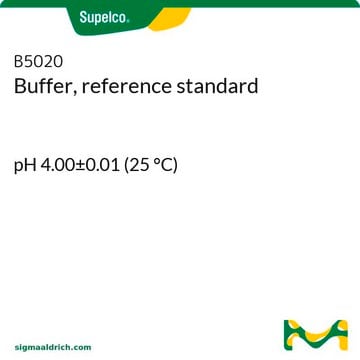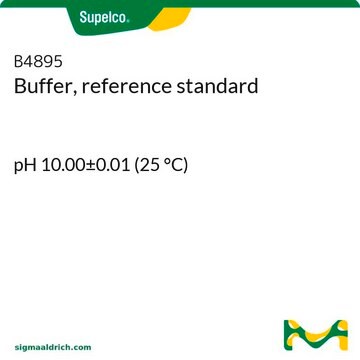1.09478
Ammonium buffer solution
for complexometry (ammonium chloride/ammonia) pH = 10-11
Synonyme(s) :
Ammonium Salt Buffer Solution
About This Item
Produits recommandés
Niveau de qualité
Forme
liquid
Technique(s)
titration: suitable
pH
10.5 (20 °C in H2O)
Densité
0.978 g/cm3 at 20 °C
Température de stockage
15-25°C
Application
- Ultratrace Detection of Nickel(II) Ions in Water Samples Using Dimethylglyoxime-Doped GQDs as the Induced Metal Complex Nanoparticles by a Resonance Light Scattering Sensor.: This study employs ammonium buffer solution in a novel sensor setup for the ultra-sensitive detection of nickel ions, highlighting its potential for environmental monitoring and pollution control (Pimsin N et al., 2021).
- Simple flow injection colorimetric system for determination of paraquat in natural water.: Ammonium buffer solution is utilized in a flow injection analysis system, simplifying the detection of paraquat in water, which can be crucial for ensuring water safety and environmental protection (Chuntib P et al., 2015).
- A simple and sensitive flow-injection on-line preconcentration coupled with hydride generation atomic fluorescence spectrometry for the determination of ultra-trace lead in water, wine, and rice.: This method uses ammonium buffer solution to enhance the sensitivity and selectivity of lead detection, important for food safety and public health (Wu H et al., 2007).
- On-line organoselenium interference removal for inorganic selenium species by flow injection coprecipitation preconcentration coupled with hydride generation atomic fluorescence spectrometry.: Utilizes ammonium buffer to segregate and quantify selenium in complex samples, a critical advancement for environmental and health-related studies (Wu H et al., 2007).
- On-line arsenic co-precipitation on ethyl vinyl acetate turning-packed mini-column followed by hydride generation-ICP OES determination.: In this research, ammonium buffer solution plays a crucial role in the online preconcentration technique for arsenic, essential for monitoring arsenic contamination in various matrices (Gil RA et al., 2007).
Mention d'avertissement
Danger
Mentions de danger
Conseils de prudence
Classification des risques
Aquatic Acute 1 - Aquatic Chronic 3 - Eye Dam. 1 - Skin Corr. 1B - STOT SE 3
Organes cibles
Respiratory system
Code de la classe de stockage
8B - Non-combustible, corrosive hazardous materials
Classe de danger pour l'eau (WGK)
WGK 2
Point d'éclair (°F)
Not applicable
Point d'éclair (°C)
Not applicable
Certificats d'analyse (COA)
Recherchez un Certificats d'analyse (COA) en saisissant le numéro de lot du produit. Les numéros de lot figurent sur l'étiquette du produit après les mots "Lot" ou "Batch".
Déjà en possession de ce produit ?
Retrouvez la documentation relative aux produits que vous avez récemment achetés dans la Bibliothèque de documents.
Les clients ont également consulté
Notre équipe de scientifiques dispose d'une expérience dans tous les secteurs de la recherche, notamment en sciences de la vie, science des matériaux, synthèse chimique, chromatographie, analyse et dans de nombreux autres domaines..
Contacter notre Service technique













